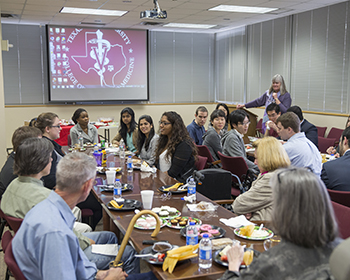March is Multiple Sclerosis Awareness Month
COLLEGE STATION, TX – The 19th Annual English Tea benefiting members of the Brazos Valley Multiple Sclerosis Patient’s Support Group (BVMSPSG) was held in the Mark Francis Room at the Texas A&M College of Veterinary Medicine & Biomedical Sciences (CVM) on Feb. 8, 2014. Dr. Jane Welsh and Dr. Jianrong Li-who are both professors in the Department of Veterinary Integrative Biosciences at the CVM-and their scientific teams hosted the meeting and provided tea and crumpets for everyone.

In MS patients, the immune system attacks myelin membranes that surround nerves, making it difficult for the nerves to conduct electrical impulses. When myelin is damaged as a result of MS, a scar forms in its place. These scars prevent nerve signals from traveling through the body. At the onset of MS, more than 80 percent of those diagnosed had suffered a highly stressful life event in the preceding year.Ever since the first English Tea, held in 1994, it has provided a forum for discussion of advances in Multiple Sclerosis (MS), and allowed graduate students to present their research to members of the BVMSPSG, demonstrating the vital role that biomedical research plays in promoting public health.
Research from the Welsh lab suggests that viral infections combined with stress are important factors in developing MS. The Li lab presented their recent findings on critical roles for myeloid cells in triggering neuro-inflammation and myelin damage in animal models of MS. Myeloid cells include several types of cells that regulate the immune response. Results from their animal studies also suggest that drugs targeting specific signals in the brain can confer protection against myelin destruction.
Members of the BVMSPSG welcomed the scientific information and shared their own unique perspectives on living with MS, which included suggestions on which medications to take, how to deal with depression, and finding the right doctor or neurologist to care for their needs.
“The narrowing of the research focus on MS by the students and professors at the CVM holds hope that new interventions may be developed that will emphasize the good that medical treatment can achieve, while minimizing the awful side effects that may develop,” said Peggy Brannon, a community member who attended the first meeting in 1994 and has never missed a meeting.
“The members of the BVMSPSG have greatly inspired our students and postdoctoral fellows and contributed to the development of research ideas,” Welsh said. “We look forward to our annual meetings with them and also regular emails from them about current MS research-they really keep us on our toes!”


